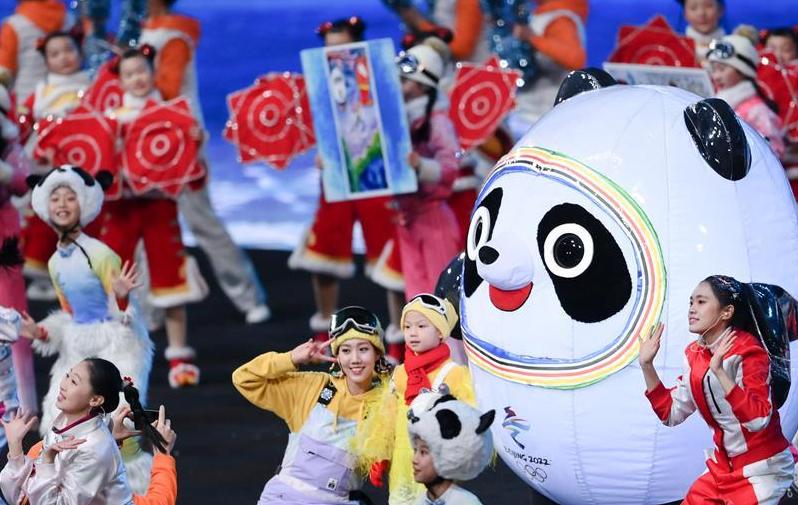
The quadrennial Winter Olympics have come to a perfect end in Beijing a few days ago. In this short period of three weeks, China has allowed the world to enjoy a wonderful feast of ice and snow. The Chinese team played at its own doorstep, and with the excellent performance of the Han Cong/Sui Wenjing combination, the Chinese team won the ninth gold medal.
In the end, the Chinese delegation ranked third in the medal table with a score of 9 gold, 4 silver and 2 bronze, and 9 gold medals and 15 medals created the highest number in the history. With the sweat of hard work and exquisite technology, China's Olympic athletes let the five-star red flag fly in the Olympic venues again and again, and the impassioned march of the volunteer army made every Chinese boil with blood.
Not only that, athletes and journalists from most countries invited to the Beijing Winter Olympics have given a very high evaluation to the Beijing Winter Olympics. National Olympic Committee President Bach directly used the three concise and highly high words of "simple, safe and wonderful" to praise China's unique and wonderful Winter Olympic Games presented to the world under the shadow of the new crown virus in the world!
What's more, tears filled his eyes when he left the Winter Olympic Village. Japanese speed skater Nao Kodaira left a note of thanks Chinese, while American skier Carly Margulis took away all the pillows, pendants, etc. related to the ice piers, and Australian skier Scotty James wrote when recording the night view of the Olympic Village: China once again handed over a 100-point answer sheet.
However, it is not so easy to hand over a 100-point answer sheet to the people of the world!
Although Beijing has experience in hosting the 2008 Summer Olympics, the venue layout and facilities of the Winter Olympics are very different from previous Olympic Games. Moreover, the main venue of this Winter Olympic Games is in Zhangjiakou City, Hebei Province, which also adds more expenditure and difficulty to the preparation of the Beijing Winter Olympic Games.
Not only that, when Beijing bid to qualify for the 2022 Winter Olympics, on the surface, European and American countries were happy for China, but in fact, these countries were waiting to see China's jokes, and even the artificial snowmaking technology at the venue was completely blocked. In this case, Chinese technicians can only rely on their own research. Invisibly, this also increased the cost of the Beijing Winter Olympics and delayed the preparatory process for the Beijing Winter Olympics.
Moreover, unlike the Pyeongchang Winter Olympics and the Tokyo Olympics, the Beijing Winter Olympics coincided with the severe moment of the global spread of the epidemic, and China had to add more security inspections and security work in order to cope with the epidemic. It is understood that South Korea spent a total of $13 billion on the Pyeongchang Winter Olympics, double the $6.5 billion originally estimated. The main thing is that there is no new crown epidemic in 2018, and they do not have too many restrictions on venue tickets.
The Tokyo Olympics were postponed for a year, and although there were also epidemic factors at that time, the epidemic did not rage as much as it does today, and the virus did not mutate. Overall, the Tokyo Olympics have more time to prepare and prepare. But even so, Japan lost nearly $40 billion.
So, under the circumstance that the epidemic situation is relatively more severe and the technical and other conditions are more difficult to overcome, what is the loss of the Beijing Winter Olympics?
In fact, the Beijing Winter Olympics adhered to the concept of "green frugality", and in many devices, the facilities of the 2008 Beijing Olympic Games were still used. Although some of the changes will cost you, this has brought spending to around $3.9 billion, with other spending mainly focused on transportation, health care, and food.
In addition, the global sponsor of the Beijing Winter Olympics is close to 160 million US dollars, and the domestic sponsor revenue is also about 100 million US dollars. Coupled with the $0.8 billion brand license, the Beijing Winter Olympics guaranteed $340 million in revenue.
In addition, after the beijing Winter Olympics, the transfer of interests around it has not stopped. These revenues are expected to reach about $2.5 billion.
For example, television broadcast costs, the sale of mascots, and so on. Among them, the popularity of the "ice pier" is amazing, whether it is athletes, journalists or ice and snow enthusiasts at home and abroad, they have shown great interest in the ice pier, and the famous NBA star Morant even openly bought an ice pier for his children on social media!
So while the Beijing Winter Olympics were generally unprofitable, China has done its best compared to several other Games, minimizing losses. Moreover, from another point of view, China can still bring a safe, simple and wonderful Winter Olympics to the world at such a severe moment of the global epidemic, and it is also an excellent opportunity to show the world the strength of a big country, and this brings China more than 3.9 billion US dollars!